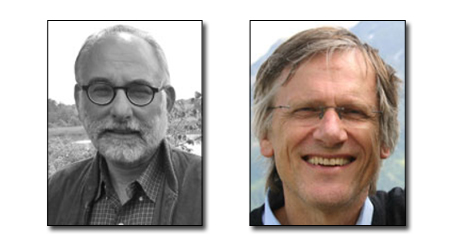Science Historians to Reflect on “Scientific Revolutions” and Science Philosopher Thomas Kuhn at MBL Friday Evening Lecture, July 27

FOR IMMEDIATE RELEASE: Tuesday, July 24, 2012 Contact: Gina Hebert, Senior Publicist/Development Communications, Marine Biological Laboratory, Phone: (508) 289-7725, E-Mail: ghebert@mbl.edu
MBL, Woods Hole, MA – Thomas Kuhn’s controversial 1962 book, The Structure of Scientific Revolutions, changed the way that many people look at science. Once, science seemed to be the constant accumulation of “facts,” with each fact a permanent addition to the body of our knowledge. A very different picture emerged from Kuhn’s historical research. The Structure of Scientific Revolutions was deeply influential in both academic and popular circles and introduced the term "paradigm shift," which has since become an English-language staple.
On the 50th anniversary of The Structure of Scientific Revolutions science historians Jed Buchwald of the California Institute of Technology, and Paul Hoyningen-Huene, of the Leibniz University of Hannover, Germany will reflect on scientific revolutions to see what has been learned. Their MBL Friday Evening Lecture titled, “Is Science Revolutionary? Thomas Kuhn and the Structure of Science,” will be held on Friday, July 27 at 8:00 PM in the MBL's Lillie Auditorium, 7 MBL Street, Woods Hole. It is free and open to the public.
Physics historian Jed Buchwald is the Doris and Henry Dreyfuss Professor of History at the California Institute of Technology. He was previously director of the Dibner Institute for the History of Science and Technology and the Bern Dibner Professor of the History of Science at MIT. Dr. Buchwald received his B.A. from Princeton University, where he studied under Thomas Kuhn, and both his M.A. and Ph.D. from Harvard University. He is a member of the American Philosophical Society, the Académie Internationale d’Histoires des Sciences, the American Association for the Advancement of Science and was a Killam Fellow and a MacArthur Fellow. Dr. Buchwald is the author or co-author of four books and has edited eight collections. He recently completed Newton and the Origin of Civilization with Mordechai Feingold (to be published November, 2012).
Paul Hoyningen-Huene is a theoretical physicist and philosopher who is a Professor of Philosophy and Founding Director of the Center for Philosophy and Ethics of Science at the Leibniz University of Hannover, Germany. He specializes in the general philosophy of science, dynamics of scientific theory change, reduction and emergence, ethics of science, and metaethics. From 1984 to 1985, he was a visiting scholar at MIT, with Thomas Kuhn. Dr. Hoyningen-Huene is a member of the American Philosophical Association, the History of Science Society, the German National Academy of Sciences Leopoldina, the International Academy of Science, and the Philosophy of Science Association. His publications have been featured in many journals around the world. He most recently finished a book manuscript with the (tentative) title: Systematicity: The Nature of Science to be published by Oxford University Press.
Additional Event —
MBL HISTORY AND PHILOSOPHY OF SCIENCE DISCUSSION: Why Do We Want Science to be Revolutionary, and Should We?
Panelists include: Gary Borisy, President and Director, MBL: Jed Buchwald, CIT; James Collins, ASU; Paul Hoyningen-Huene, Leibniz University of Hanover; Manfred Laubichler, ASU
Saturday, July 28, 10 AM - 12 PM, Candle House, Room 104, 127 Water St., Woods Hole
The History and Philosophy of Science Program, part of the MBL’s Center for Library and Informatics, is collaboration between Arizona State University and the MBL.
The Friday Evening Lecture Series will continue throughout the summer at the MBL. The remaining lectures in the series are below. For more information, visit mbl.edu/FEL
August 3, 2012
Glassman Lecture
"Protein Folding in the Cell: The final Step of Information Transfer" - Arthur L. Horwich, Yale University, Howard Hughes Medical Institute
August 10, 2012
Joshua Lederberg Lecture
"Food and Sex: The Neurogenetics of Innate Behavior"
Leslie B. Vosshall, The Rockefeller University; Howard Hughes Medical Institute
August 17, 2012
Sager Lecture
"How Bacteria Talk To Each Other"
Bonnie L. Bassler, Princeton University; Howard Hughes Medical Institute
—### —
The Marine Biological Laboratory (MBL) is dedicated to scientific discovery and improving the human condition through research and education in biology, biomedicine, and environmental science. Founded in 1888 in Woods Hole, Massachusetts, the MBL is an independent, nonprofit corporation.
